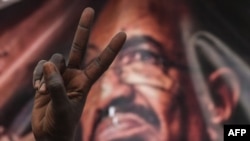Sudan's military has blocked streets in central Khartoum leading to army headquarters, and banned public celebrations of the 1-year anniversary of the ouster of former president Omar al-Bashir.
In a press release, a military spokesman said they’re not allowing any kind of gatherings around army headquarters. Hundreds of heavy vehicles and military pickups are surrounding the area.
Critics are loud on social media. Activists raised eyebrows over the army’s decision.
Protesters, who packed the public uprising against Bashir a year ago, are upset.
Hussam Goraish was in prison for three months until protesters broke down the doors and freed him on the day of Bashir’s ouster.
Speaking on Whatsapp, Goraish said as protesters, they would love to mark the anniversary, but unfortunately the military has blocked the streets and that has had a negative impact as it was a mistake in a first place. He added that people are so aware of the coronavirus pandemic and the health situation in the country, so the gathering wouldn’t be large.
Some groups of protesters marked the anniversary by singing and raising the national flag on houses.
It was on April 6, 2019, the military ended Bashir’s 30-year rule after four months of mass protests and massive rights violations allegedly committed by his security apparatus.
After the ouster, a pro-democracy camp near army headquarters was destroyed by soldiers who allegedly killed more than 100 protesters and left hundreds injured.
In a Whatsapp message, political analyst Alfatih Mahmoud said now that Bashir is out of power, the military no longer sees a need for public demonstrations against him.
Mahmoud said not allowing gatherings and celebration has no political logic for the military generals anymore. Before, the gathering was required as a political cover to make alienation to the crowds successful, but now they consider it as a military area, and the mission has ended, to not make new pressures against them. They consider themselves as governance partners in ruling structures, not in front of army headquarters.
The Sudanese army was founded in 1955 by Britain,which defended Sudan under British rule until Sudan’s independence a year later.
Since 1956, the Sudanese military oversaw Sudan during three long periods, including during Bashir’s three decades as president.
Retired lieutenant colonel and military expert Omer Ahmed said Sudan’s government stability remains fragile.
Omer said there’s an assumption and a possibility of a military coup,despite having a small chance of succeeding because of the public refusal, and also the international community agreeing with public’s desire. But coup makers and adventurers don’t think logically.
Under a power-sharing agreement signed by a military general and protesters, the military will rule Sudan for 21 of 39 months ahead of civilian elections.
Sudan’s supreme court has confirmed Bashir’s two-year prison sentence and says it’ll demilitarize members of the military who were loyal to him.





